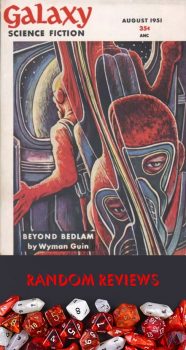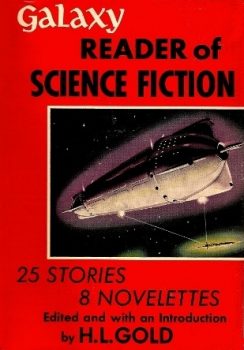Random Reviews: “The Pilot and the Bushman” by Sylvia Jacobs

Sylvia Jacobs has a career in science fiction spanning eighteen years, from the publication of “A Stitch in Time” in the April 1951 issue of Astounding Science Fiction and running through the April 1969 issue of Galaxy Magazine, when her story “Slave to Man” appeared. Her body of work, however, is not entirely reflective of that longevity, consisting of eight short stories and two essays, all except one of which were published within a decade of her first appearance.
Her second story, “The Pilot and the Bushman,” appeared in the August 1951 issue of Galaxy Magazine and would eventually be reprinted in Galaxy Reader of Science Fiction the following year. It belongs to the same category of science fiction as Fred Pohl and C.M. Kornbluth’s The Space Merchants (originally published in Galaxy as Gravy Planet), using an advertising executive to look at consumerism and aliens, although Jacobs’ work has a very different feel than the more famous story.
Jacobs tells the tale of Jerry Jergens, a New York advertising executive, and the Ambassador from Outer Space. Following an accidental statement by the Ambassador that aliens had a Matter Repositor which made trade and manufacturing unnecessary, Earth began to suffer from a buyer’s strike. The Ambassador admits that discussing the Repositor was a mistake, but he refuses to deny its existence and interstellar law forbids him from sharing the technology with humans. Jerry, however has an offer to help get the Ambassador out of the fix he’s in. In return for which, Jerry wants to be able to market Earth to aliens, a proposition that the Ambassador does not see as something that can be successful.
The story tracks Jergens’ success in introducing marketing to a galactic culture that hasn’t acquired an immunity to the claims made by advertisers. With a monopoly and a whole galaxy to draw from, Jergens finds himself not only incredibly wealthy, but also powerful, maintaining regular meetings with the Ambassador from Outer Space, even as the nature and power structure of their relationship alters by the very agreement the Ambassador made with Jergens at the beginning of the story.

There is little conflict in the story as Jergens moves from one success to another, the tension mostly coming from the question of where Jergens’ successes will take him and what his endgame will eventually be. Naturally, there is also the possibility that his house of cards will come tumbling down, especially as Jacobs introduces more aliens into the story who come to the Earth as tourists.
Unfortunately, there is little alien about her aliens. When introducing the Ambassador from Outer Space, Jacobs writes, “Jerry had been prepared for anything—a scholarly brontosaurus, perhaps, or an educated squid or giant caterpillar with telepathic powers. But the Ambassador didn’t even have antennae, gills, or green hair. He was a completely normal and even handsome human being.” The same can be said for the other aliens who make an appearance in the story.
The title of the story refers to a story of pilots flying over less developed parts of the Earth and the way they were viewed by the natives. Although Jerry presents the story as the pilots being analogs to the Ambassador and other aliens and humans as the bushmen, it rapidly becomes clear that there is an undercurrent of the pilots underestimating the intelligence and resources of the bushmen.
Jacobs’ idea certainly has potential, as demonstrated the next year by Pohl and Kornbluth, however she failed to fully pursue that potential, giving Jergens a reasonably straightforward story arc and downplaying both the Ambassador from Outer Space and other aliens, more details of which could have elevated the story and made it more memorable.
 Steven H Silver is an eighteen-time Hugo Award nominee and was the publisher of the Hugo-nominated fanzine Argentus as well as the editor and publisher of ISFiC Press for 8 years. He has also edited books for DAW, NESFA Press, and ZNB. His most recent anthology is Alternate Peace and his novel After Hastings was published in 2020. Steven has chaired the first Midwest Construction, Windycon three times, and the SFWA Nebula Conference 6 times. He was programming chair for Chicon 2000 and Vice Chair of Chicon 7.
Steven H Silver is an eighteen-time Hugo Award nominee and was the publisher of the Hugo-nominated fanzine Argentus as well as the editor and publisher of ISFiC Press for 8 years. He has also edited books for DAW, NESFA Press, and ZNB. His most recent anthology is Alternate Peace and his novel After Hastings was published in 2020. Steven has chaired the first Midwest Construction, Windycon three times, and the SFWA Nebula Conference 6 times. He was programming chair for Chicon 2000 and Vice Chair of Chicon 7.